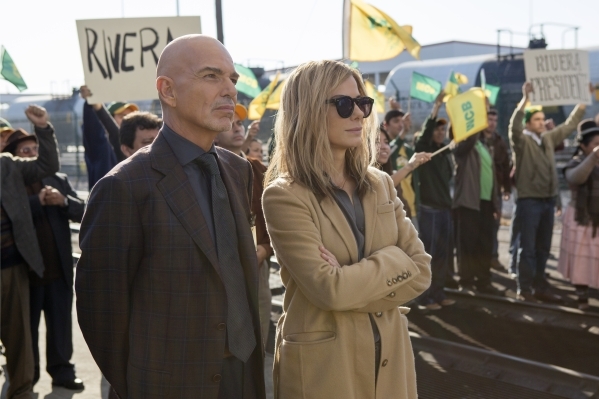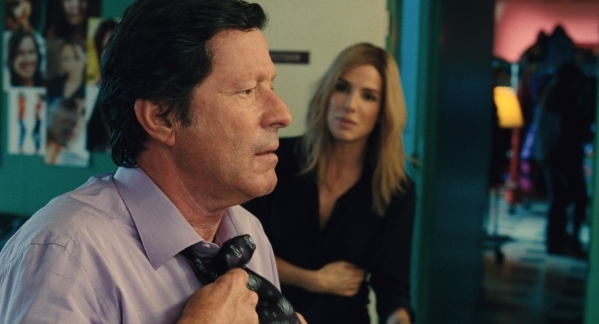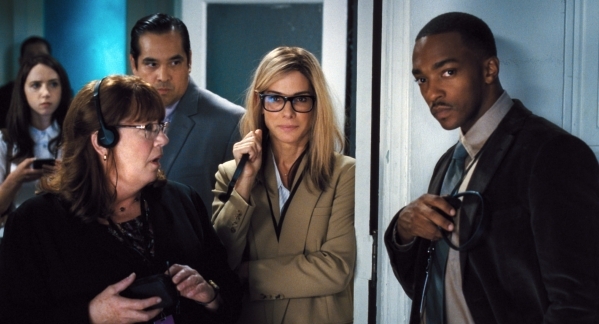Sandra Bullock’s ‘Brand’ feels generic
Bolivian politics? Indigenous peoples? The International Monetary Fund?
The makers of "Our Brand Is Crisis" are practically daring U.S. moviegoers to turn out to see their film.
It's being pitched less as an earnest drama than as a political romp about rival dirty tricksters, portrayed by Oscar winners Sandra Bullock and Billy Bob Thornton. But while either approach could have resulted in a worthwhile night out for grown-ups, the resulting jackalope of a movie isn't going to fare too well in any polls.
Campaign strategist Jane Bodine (Bullock) is in self-imposed exile, having given up the high-stress world of politics, along with smoking and drinking, for a life of making pottery in a remote cabin. It's been six years since she last ran a campaign, and she's lost her last four.
But when Bolivia's former President Castillo (Joaquim de Almeida) decides he wants his old job back, Jane's onetime associate (Ann Dowd) and Castillo's team leader (Anthony Mackie) convince her to come out of retirement. Of course, the job offer comes with the standard caveat: Win and they'll share the credit; lose and she'll shoulder the blame alone.
Once they arrive in Bolivia, Jane sleepwalks through several scenes, projecting everything from boredom to queasiness. It's all blamed on altitude sickness, although there's clearly something more to it. "She hasn't lit the fire yet," Mackie's Ben says by way of covering for her. But while Jane eventually kicks into gear, quoting liberally from Sun Tzu and Warren Beatty along the way, "Our Brand Is Crisis" never does.
Not that writer Peter Straughan ("Tinker Tailor Soldier Spy") and director David Gordon Green ("Pineapple Express"), dramatizing the 2005 James Carville documentary of the same name, don't try. During shooting for a Castillo campaign commercial, a llama is hit by a car. And when they notice their opponent's bus is ahead of them on the way to an event, Jane and company convince their driver to overtake that bus on a narrow, windy road, as much screaming ensues, so Jane (or possibly someone's stunt butt) can moon the other team. But those scenes just feel desperate.
They also feel as out of place as the detour in which Jane and her team give a young volunteer (Reynaldo Pacheco) a ride home, meet his brother (Octavio Gomez BerrÃos) and friend (Luis Chavez) and head out for a wild night of drinking and discussing 18th century Scottish economist Adam Smith, as young, impoverished Bolivians are wont to do.
A few of the bits with Jane and her archrival, Pat Candy (Thornton), crackle. Thornton's in full-on Mephistophelian mode — something Candy actually references — while Jane reads from Goethe's "Faust." But too often, their feud devolves into childish antics while a vulnerable nation hangs in the balance.
Despite the monumental task of rebranding Castillo — he's despised among much of the electorate because of the deadly protests that haunted his previous term and is viewed as "arrogant, unapproachable, out of touch" — Jane mostly just has him roll up his shirtsleeves and shed a tear on a talk show.
One minute, "Our Brand Is Crisis" is a tame political satire, gently lampooning Castillo's main opponent and Candy's boss (Louis Arcella) for his great hair and tendency to sing "The Rose" at campaign stops. The next, it asks you to care about the underlying anger among the indigenous peoples, who make up 60 percent of the population, and their distrust of the IMF. It's as though the movie is every place and no place at the same time.
It's also the second political movie this week, following the too-long "Rathergate" film "Truth," that's just left me bored.
That's mostly because there's simply no one to root for or against. Had the dirty tricks been dirtier, the cynicism harsher and the nastiness more delicious, "Our Brand Is Crisis" could have made for great, biting satire.
Instead, for all the talk of branding and rebranding, the whole thing just feels generic.
— Contact Christopher Lawrence at clawrence@reviewjournal.com. On Twitter: @life_onthecouch

















